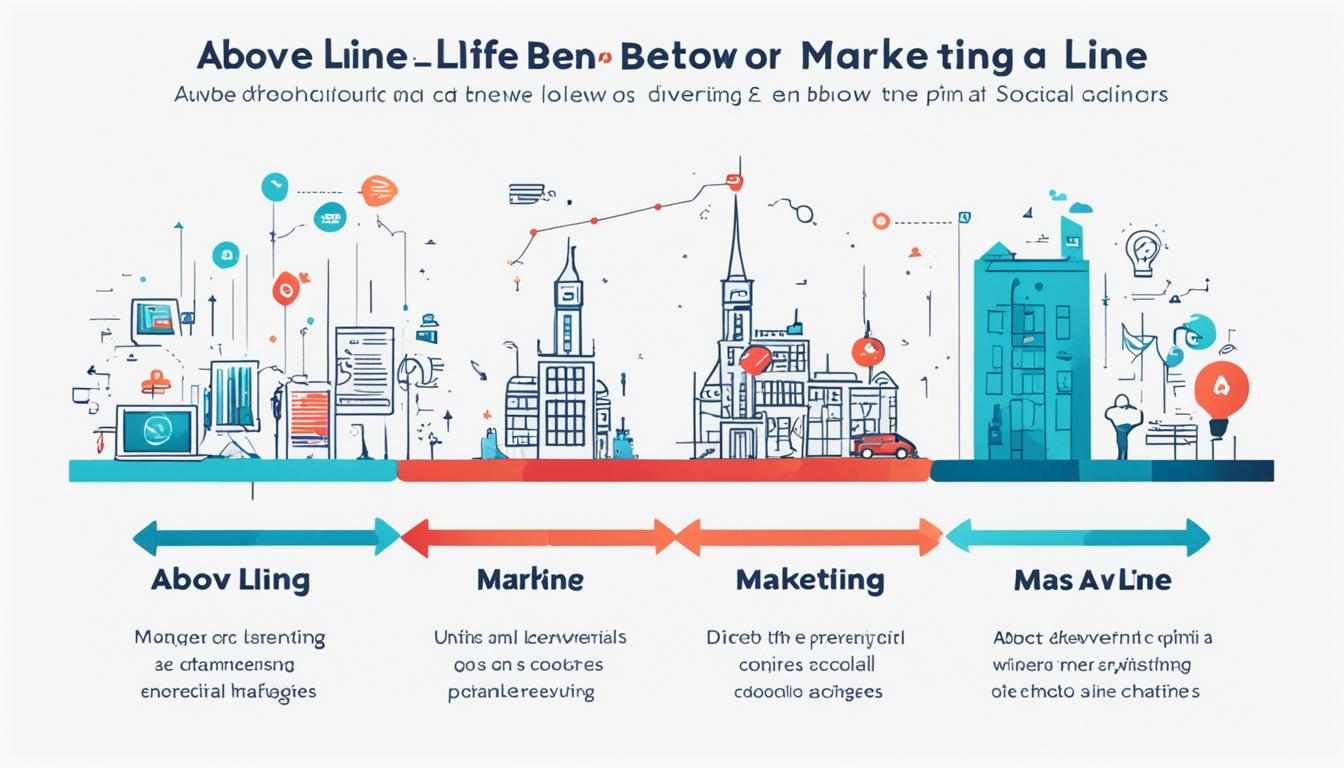Brand Manager and Marketing Manager are both key roles within a company’s marketing department, but they have distinct responsibilities and focus areas. Understanding the differences between these roles is essential for organizations looking to effectively manage their brand and marketing strategies.
Key Takeaways:
- Brand Managers focus on internal brand development, crafting strategies for brand management, brand strategy, and brand development.
- Marketing Managers oversee external promotional efforts, utilizing marketing strategies, marketing planning, and brand promotion to reach customers and drive sales.
- Brand Managers specialize in building and maintaining a specific brand’s identity and equity.
- Marketing Managers handle marketing activities, marketing strategy, and marketing management for product lines or the entire company.
- Both roles require effective communication and the ability to build relationships with stakeholders.
Understanding the Role of a Brand Manager
A Brand Manager plays a crucial role in developing, maintaining, and promoting a specific brand’s identity and equity. Their responsibility is to ensure that the brand resonates with the target audience and stands out in the market.
Brand Managers are strategic thinkers who define brand strategy and create brand guidelines that shape how the brand is communicated and represented. They develop and execute brand campaigns that effectively convey the brand’s message and value proposition to consumers. By closely monitoring brand performance, Brand Managers are able to assess the success of their strategies and make necessary adjustments to maintain a competitive edge.
Brand Identity and Equity
One of the primary responsibilities of a Brand Manager is to establish and maintain a strong brand identity. This involves creating a distinct personality, image, and set of values that differentiate the brand from its competitors. Brand Managers work closely with creative teams and stakeholders to develop a cohesive brand identity that resonates with consumers and builds brand equity.
Brand Strategy and Guidelines
A Brand Manager is responsible for crafting brand strategies that guide all aspects of brand communication and engagement. This includes defining the brand’s target audience, positioning in the market, and key brand messages. Brand guidelines are developed to ensure consistent brand representation across all touchpoints, including visuals, tone of voice, and brand personality.
Brand Campaigns and Performance Monitoring
Brand Managers are heavily involved in the planning, execution, and evaluation of brand campaigns. They collaborate with internal teams and external agencies to develop effective marketing communications and promotional activities that generate brand awareness and engagement. Throughout the campaign, Brand Managers closely monitor brand performance by analyzing key metrics, such as market share, customer loyalty, and brand perception.
To better understand the role of a Brand Manager, let’s take a look at this illustrative table:
| Responsibilities | Actions |
|---|---|
| Developing Brand Strategy | Conduct market research, define target audience, establish brand positioning |
| Creating Brand Guidelines | Develop visual and verbal brand guidelines, ensuring consistent brand representation |
| Executing Brand Campaigns | Create and manage brand campaigns, collaborate with internal and external teams |
| Monitoring Brand Performance | Analyze key metrics, evaluate brand health, make adjustments for optimal performance |
As demonstrated in the table and image, a Brand Manager’s role encompasses various aspects of brand management, from strategy development to performance monitoring. Their expertise in brand identity, equity, strategy, guidelines, campaigns, and performance play a crucial role in shaping and strengthening a brand’s position in the market.
Exploring the Responsibilities of a Marketing Manager
A Marketing Manager plays a crucial role in overseeing and executing various marketing activities, strategies, and plans for a product line, business unit, or the entire company. They are responsible for developing and implementing effective marketing plans, managing the marketing team, and ensuring that the marketing objectives are aligned with the company’s goals.
Marketing managers are involved in a variety of responsibilities, including:
- Developing marketing strategies to promote products or services.
- Creating comprehensive marketing plans to reach the target audience.
- Executing marketing campaigns through various channels, such as digital platforms, traditional media, and events.
- Analyzing market trends, consumer behavior, and competitors to identify opportunities and challenges.
- Collaborating with cross-functional teams, such as sales, product development, and finance, to ensure consistent messaging and integrated marketing efforts.
- Managing the marketing budget effectively to maximize ROI.
- Evaluating the performance of marketing activities and campaigns, using key metrics and analytics.
- Adjusting marketing strategies and plans based on market insights and performance data.
A Marketing Manager plays a pivotal role in driving the success of a company’s marketing initiatives. They need to have a deep understanding of the target audience, market dynamics, and the company’s products or services. Additionally, strong leadership, communication, and analytical skills are essential for effective management of the marketing team and achieving marketing objectives.
Let’s take a closer look at an example of marketing activities managed by a Marketing Manager:
| Marketing Activities | Description |
|---|---|
| Developing Marketing Strategies | Planning and formulating strategies to promote products or services effectively. |
| Creating Marketing Plans | Designing detailed plans outlining the marketing objectives, target audience, messaging, and tactics. |
| Executing Marketing Campaigns | Implementing marketing campaigns through various channels to reach the target audience and generate leads or sales. |
| Analyzing Market Trends | Monitoring industry trends, consumer behavior, and competitors to identify opportunities and adapt marketing strategies accordingly. |
| Managing Marketing Team | Leading, mentoring, and coordinating the activities of the marketing team to ensure efficient execution of marketing plans. |
| Evaluating Campaign Performance | Measuring and analyzing the performance of marketing campaigns using relevant metrics and analytics tools. |
| Adjusting Strategies | Based on data and insights, refining marketing strategies and plans to optimize outcomes and drive business growth. |
With a skilled Marketing Manager at the helm, companies can leverage their marketing efforts, engage with the target audience, and achieve their marketing objectives effectively.
Differentiating the Focus Areas of Brand Managers and Marketing Managers
Brand Managers and Marketing Managers have distinct areas of focus within the marketing department. While both roles contribute to the overall success of a brand or product, their responsibilities differ in scope and emphasis.
Brand Manager Focus:
Brand Managers primarily concentrate on building, developing, and managing the brand identity and equity of a specific product or brand within the company’s portfolio. Their main objective is to create a strong and distinctive brand image that resonates with the target audience.
Key areas of focus for Brand Managers include:
- Defining and implementing brand strategy
- Creating and enforcing brand guidelines
- Developing and executing brand campaigns
- Monitoring and analyzing brand performance
Marketing Manager Focus:
Marketing Managers have a broader scope and focus on the marketing activities and strategies for an entire product line, business unit, or the company as a whole. They are responsible for crafting effective marketing plans and executing strategies to promote and sell products or services.
Key areas of focus for Marketing Managers include:
- Identifying target audience and market segments
- Developing comprehensive marketing strategies
- Planning and overseeing marketing campaigns
- Managing the marketing team and resources
While Brand Managers concentrate on building and managing the brand’s identity, Marketing Managers focus on driving sales and achieving marketing objectives for the entire product line or company.
Comparison of Brand Manager and Marketing Manager Focus Areas
| Focus Areas | Brand Managers | Marketing Managers |
|---|---|---|
| Responsibilities | Building, developing, and managing the brand identity and equity | Planning and executing marketing strategies for products or services |
| Scope | Specific product or brand within the company’s portfolio | Entire product line, business unit, or company |
| Key Objectives | Create a strong and distinctive brand image | Drive sales and achieve marketing objectives |
| Key Activities | Defining brand strategy, creating brand campaigns, monitoring brand performance | Developing marketing strategies, planning and overseeing campaigns |
| Target Audience | Brand-specific target audience | Overall target audience for the product line or company |
This table highlights the core differences between the focus areas of Brand Managers and Marketing Managers. It is important for companies to understand these distinctions in order to effectively leverage the strengths of each role and achieve their overall branding and marketing objectives.
Strategy Development in Brand Management and Marketing Management
When it comes to strategy development, Brand Managers and Marketing Managers have distinct focuses and objectives. Brand Managers are responsible for formulating strategies that maintain and enhance the brand’s identity, while Marketing Managers create comprehensive marketing strategies to support product launches, campaigns, and sales efforts.
Brand Managers prioritize building and protecting the brand’s reputation, ensuring that it aligns with the target audience and resonates with customers. They develop strategies that communicate the brand’s unique value proposition and strengthen its positioning in the market.
On the other hand, Marketing Managers emphasize effective promotion of products or services. They develop marketing strategies that encompass various channels and tactics to reach the target audience, drive customer engagement, and ultimately boost sales. Their strategies may involve digital marketing, advertising campaigns, public relations, and other promotional efforts.
The table below summarizes the key differences in strategy development between Brand Managers and Marketing Managers:
| Brand Manager Strategy | Marketing Manager Strategy |
|---|---|
| Focuses on maintaining and enhancing the brand’s identity | Emphasizes effective promotion of products or services |
| Builds and protects the brand’s reputation | Develops comprehensive marketing strategies for product launches, campaigns, and sales efforts |
| Defines strategies that communicate the brand’s unique value proposition | Utilizes various channels and tactics to reach the target audience and drive customer engagement |
By understanding these differences, organizations can leverage the expertise of both Brand Managers and Marketing Managers to develop a holistic approach that effectively promotes the brand and achieves business objectives.
Differences in Product Knowledge and Communication Styles
When it comes to product knowledge, Brand Managers and Marketing Managers have distinct areas of expertise. Brand Managers possess an in-depth understanding of the specific brand they are responsible for, diving deep into its unique features and positioning. Their knowledge extends beyond just the product itself; they are well-versed in the brand’s identity, values, and target audience.
On the other hand, Marketing Managers require a broader knowledge base that encompasses not only the specific brand but also the entire product line and market trends. Their focus is not limited to a single brand; instead, they need to understand the competitive landscape, consumer preferences, and industry trends to create effective marketing strategies.
Regarding communication styles, Brand Managers prioritize consistent brand messaging and the effective communication of the brand’s unique value proposition. They ensure that all communication channels, whether it’s advertising, social media, or customer interactions, align with the brand’s identity and resonate with the target audience.
Marketing Managers, on the other hand, emphasize communication strategies that reach customers and drive sales. They adapt their communication approach based on market trends, consumer insights, and the specific objectives of marketing campaigns. Their focus is to effectively convey the brand’s message and offerings to the target audience in a persuasive and engaging manner.
To summarize, Brand Managers possess deep knowledge about a specific brand, while Marketing Managers have a broader understanding of product lines and market trends. Brand Managers communicate the brand’s unique value proposition consistently, while Marketing Managers focus on crafting communication strategies that resonate with customers and drive sales.
Exploring the Hierarchy of Brand Managers and Marketing Managers
Within the marketing department, there is a clear hierarchy that distinguishes the roles and responsibilities of Brand Managers and Marketing Managers. Understanding this hierarchy is essential for effectively managing a company’s brand and marketing strategies.
Brand Managers typically fall under the marketing department and play a crucial role in developing and maintaining the brand identity and equity of a specific product or brand. They work closely with Marketing Managers to align the brand strategy with the overall marketing objectives.
Marketing Managers, on the other hand, often hold higher positions within the marketing department and have a broader scope of responsibilities. They oversee and execute marketing strategies, plans, and campaigns for product lines, business units, or the entire company. Marketing Managers may report to a Director of Marketing or Chief Marketing Officer (CMO) who oversees the entire marketing department.
While Brand Managers focus on building and managing the brand’s identity and equity, Marketing Managers have a broader focus on marketing activities and strategies. The Brand Manager hierarchy within the marketing department allows for efficient coordination and collaboration between these two roles.
Here is a visual representation of the hierarchy:
| Director of Marketing (CMO) | Marketing Manager |
|---|---|
| Brand Manager | Brand Manager |
This hierarchy ensures that brand management and marketing efforts are aligned with the overall marketing goals of the company. It facilitates effective communication, decision-making, and coordination within the marketing department to maximize the impact of brand strategies and marketing campaigns.
Unique Contributions of Brand Managers and Marketing Managers
Brand Managers and Marketing Managers play distinct roles in building and promoting a company’s brand. While both are essential for a comprehensive marketing strategy, they contribute in different ways.
Internal Brand Building: Brand Manager Contributions
Brand Managers focus on developing and maintaining the brand’s image and perception within the organization. They work closely with various teams to ensure brand consistency across all touchpoints. By creating and implementing brand guidelines, they help shape the company’s culture and align it with the brand’s values. Brand Managers also oversee internal communication strategies to reinforce the brand message among employees.
External Brand Building: Marketing Manager Contributions
Marketing Managers primarily focus on external brand building activities. They are responsible for creating impactful advertising campaigns, developing marketing strategies that align with the brand’s objectives, and promoting products or services to the target audience. Marketing Managers identify the most effective channels for reaching customers, manage customer communication, and work closely with external stakeholders such as advertising agencies and media outlets.
While Brand Managers contribute to internal brand development, Marketing Managers are responsible for managing the external perception of the brand and driving customer engagement. Together, their efforts ensure a cohesive and successful brand building strategy.

Relationships with Stakeholders in Brand Management and Marketing Management
One of the crucial aspects of both brand management and marketing management is building and nurturing relationships with various stakeholders. For brand managers, this involves establishing and maintaining connections with stakeholders such as customers, employees, suppliers, and investors. By cultivating these relationships, brand managers can effectively communicate the brand’s values and foster trust and loyalty among stakeholders.
Marketing managers, on the other hand, focus on establishing strong connections with consumers through effective communication channels. They employ various marketing strategies to engage with the target audience, understand their needs and preferences, and build lasting relationships. By leveraging effective communication, marketing managers can enhance brand reputation, increase customer satisfaction, and drive business growth.
Effective communication is key for both brand managers and marketing managers in their interactions with stakeholders. By ensuring clear and consistent messaging, brand managers can build trust and maintain a positive brand reputation. Marketing managers, on the other hand, rely on effective communication to convey the value of products or services to consumers, address their concerns, and foster long-term relationships.
In summary, relationships with stakeholders play a vital role in both brand management and marketing management. Brand managers focus on building and maintaining relationships with various stakeholders to communicate the brand’s values, while marketing managers prioritize establishing connections with consumers through effective communication channels. By nurturing these relationships, both roles contribute to the success of the brand and overall business growth.
Conclusion
In conclusion, Brand Managers and Marketing Managers each play a vital role in promoting and building a company’s image, but they have distinct responsibilities. Brand Managers focus on internal brand development, creating strategies to effectively communicate the desired perception and messaging of the brand. Their primary goal is to build and maintain a strong brand identity, ensuring it resonates with the target audience.
On the other hand, Marketing Managers oversee external promotional efforts and utilize a variety of channels to reach customers and drive sales. They develop comprehensive marketing strategies and plans, working towards achieving the company’s marketing objectives. Marketing Managers are focused on implementing effective marketing campaigns and activities to promote products or services and drive business growth.
Understanding these differences is crucial for organizations looking to effectively manage their brand and marketing strategies. Collaboration between Brand Managers and Marketing Managers is essential to ensure a cohesive approach that aligns the internal brand development with the external promotional efforts. By maximizing the strengths and contributions of both roles, companies can create a winning combination that enhances brand development, establishes effective marketing strategies, and drives overall business success.
FAQ
What is the role of a Brand Manager?
A Brand Manager is responsible for developing, maintaining, and promoting a specific brand’s identity and equity, ensuring that it resonates with the target audience and sets the brand apart in the market. They define brand strategy, create brand guidelines, develop and execute brand campaigns, and monitor brand performance.
What are the responsibilities of a Marketing Manager?
A Marketing Manager oversees and executes marketing strategies, plans, and campaigns for a product line, business unit, or the entire company. They are responsible for developing and implementing marketing plans, managing the marketing team, and ensuring that marketing objectives are aligned with the company’s goals.
How do Brand Managers and Marketing Managers differ in their focus areas?
Brand Managers primarily concentrate on building, developing, and managing the brand identity and equity of a specific product or brand within the company’s portfolio. Marketing Managers have a broader scope and focus on the marketing activities and strategies for an entire product line, business unit, or the company as a whole.
What is the role of strategy in Brand Management and Marketing Management?
Brand Managers develop strategies to maintain and enhance the brand’s identity, while Marketing Managers create comprehensive marketing strategies for product launches, campaigns, and sales efforts. Brand Managers concentrate on building and protecting the brand’s reputation, while Marketing Managers emphasize effective promotion of products or services.
How does the product knowledge and communication style differ between Brand Managers and Marketing Managers?
Brand Managers require an in-depth understanding of the specific brand, while Marketing Managers need a broader knowledge of product lines and market trends. Brand Managers ensure consistent brand messaging and communicate the brand’s unique value proposition, while Marketing Managers focus on effective communication strategies to reach customers and drive sales.
What is the hierarchy within the marketing department for Brand Managers and Marketing Managers?
Brand Managers typically fall under the marketing department and may report to a Marketing Manager, while Marketing Managers often hold higher positions within the marketing department and may report to a Director of Marketing or Chief Marketing Officer (CMO).
How do Brand Managers and Marketing Managers contribute to brand building?
Brand Managers focus on internal brand building, developing and maintaining the brand’s image and perception within the organization. Marketing Managers focus on external brand building, creating advertising campaigns, promoting products or services, and managing customer communication.
How do Brand Managers and Marketing Managers manage relationships with stakeholders?
Brand Managers are responsible for building and maintaining relationships with stakeholders, such as customers, employees, suppliers, and investors. Marketing Managers focus on establishing strong connections with consumers through effective communication channels. Positive relationships are crucial for both roles in driving success.
What are the key takeaways from the comparison of Brand Managers and Marketing Managers?
While Brand Managers and Marketing Managers both play vital roles in promoting and building a company’s image, they have distinct responsibilities. Brand Managers focus on internal brand development, crafting strategies to communicate the desired perception and messaging. Marketing Managers oversee external promotional efforts, utilizing various channels to reach customers and drive sales. Understanding these differences is crucial for organizations looking to effectively manage their brand and marketing strategies.






